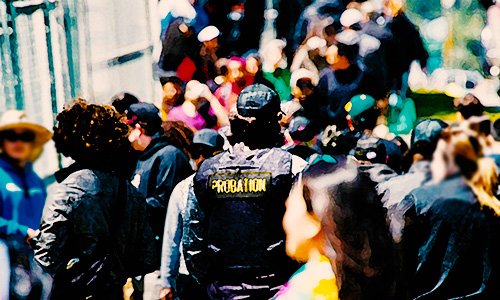In Arizona, misdemeanor probation, also called summary probation, is a way for defendants to serve their sentences outside of jail. The terms of probation will depend on the type of conviction, the circumstances of the offense, and the defendant’s background. Violating these terms can lead to a revocation, which can send the probationer to prison.

Instead of spending the duration of their sentence behind bars, defendants on misdemeanor probation would spend the time on “community supervision.”
1. What is misdemeanor probation?
At the sentencing hearing for a misdemeanor or as part of a plea agreement, the judge can sentence the defendant to probation rather than to prison. Instead of spending the duration of their sentence behind bars, defendants on misdemeanor probation would spend the time on “community supervision.” Probationers in Arizona would still have to abide by the rules and terms set down by the judge, though. However, they could continue to make a living and be with their family while serving their sentence.
There are 2 types of misdemeanor probation, which is also known as summary probation:
- supervised, and
- unsupervised.
Supervised probation requires probationers to regularly check in with a probation officer. The terms of supervised probation are usually relatively strict. Supervised probation is often for serious misdemeanor charges.
Unsupervised probation does not require probation officer meetings. The probationer merely has to follow the rules of the written court order. This is more common for low-level offenses.
In Arizona, there is also intensive probation.1 However, this is usually reserved for felony probation and more serious criminal charges.
2. What are some common terms of probation in Arizona?
The judge at the sentencing hearing has a lot of discretion in setting the terms of a defendant’s probation. The defendant’s background and the nature of the offense will strongly influence the terms.
For example, if the defendant is convicted of driving under the influence of alcohol (DUI), the terms of his or her probation will likely include:
- a driver’s license suspension, an ignition interlock device (IID), or a restricted driver’s license,
- nightly curfews,
- a court order that the probationer stay away from bars,
- prior consent to alcohol tests, and
- alcohol treatment.
Defendants convicted of a violent misdemeanor, like domestic violence or assault, will likely have different terms of release, like:
- no-contact orders or protective orders that require them to stay away from the victim,
- therapy or anger management courses,
- relinquishing the right to own or possess firearms,
- giving up drugs or alcohol, and
- travel restrictions.
Some common terms of summary probation that all defendants face are:
- regular meetings with a probation officer, if the probation is supervised,
- electronic monitoring,
- restitution payments to the victim,
- community service, and
- prohibitions against committing a new crime.
Defendants convicted of a drug crime may be eligible for drug court. Counties in the state of Arizona have the power to create these courts to administer probation for defendants who have substance abuse problems and who were convicted for a non-violent offense for the first time.2 The following areas are among those that have drug courts:
- Maricopa County, including Phoenix, Chandler, Mesa, Gilbert, Scottsdale, and Tempe,
- Pima County,
- Pinal County,
- Yavapai County, and
- Mohave County.
Even though the alternative is jail time, abiding by these terms of release is not always easy. Many probationers feel very restricted by all of the rules and stressed by the repercussions of breaking one of them. A criminal defense lawyer from an Arizona law office can help defendants by negotiating their terms of release so that the probationer is not suffocated by the limitations.
3. Are any misdemeanors ineligible for summary probation?
Some crimes have mandatory prison time and are not eligible for probation. While most of those offenses are felonies, there are some misdemeanors that could be ineligible for probation, like:
- crimes committed while the defendant was already on probation,3
- dangerous offenses,4 and
- dangerous crimes against children.5
Generally, most non-dangerous misdemeanors committed by someone with a clean criminal record are eligible for probation. However, there are a lot of exceptions to this general rule. Talking to a criminal defense attorney from a local law firm can be the best way to make sure that a particular criminal offense does not carry mandatory prison time.

Judges have a great deal of discretion in regards to the length of one’s probation sentence.
4. How long will it last?
Judges have a lot of discretion over the terms of a defendant’s misdemeanor probation in Arizona, including over how long probation will last. In many cases, the probation is not given a set length. Instead, it is a checklist of things that the probationer has to do. If there is a length, it will often depend on the class of misdemeanor that was committed:
- Class 1 misdemeanors – 3 years,
- Class 2 misdemeanors – 2 years, and
- Class 3 misdemeanors – 1 year.6
However, a DUI offense involving a blood alcohol content (BAC) of 0.15% or higher – known in Arizona as an “extreme DUI” – usually carries 5 years of probation.7
If one of the terms of probation is to pay the victim restitution – a very common term of summary probation – then the judge has the discretion to extend the probationary period if the full amount has not been paid. Judges can extend misdemeanor probation in these cases by up to 2 years.8
Certain sex offenses come with lifetime probation.9 However, these are nearly always felony offenses.
5. Can it be terminated early?
Misdemeanor probation can be terminated before the entire period has elapsed. While the court can do this on its own, it usually requires the probationer to file a Petition for Early Termination.10
Courts in Arizona will rarely terminate probation if its requirements have not yet been met. This means that probationers will generally have to:
- pay restitution in full,
- be current on all court costs and fees, and
- be finished with treatment programs or counseling requirements.
Additionally, probation is rarely terminated until the probationer has served at least half of it. Any probation violations, no matter how minor, are often enough to doom a Petition for Early Termination.
6. What is a probation violation?
A probation violation happens whenever the probationer breaks or fails to comply with a term of his or her release.
If the judge learns of a potential violation, it will schedule a probation violation hearing at the superior court. At this hearing, the prosecutor will present evidence that the probationer violated the terms of their release, while the defense lawyer will present exculpatory evidence.
If the judge decides that there was, in fact, a violation of the terms of the defendant’s release, he or she can revoke probation or strengthen it by adding new, stricter terms and conditions. If the judge revokes misdemeanor probation, the defendant will have to serve the rest of his or her sentence in prison.
This makes violating probation a serious allegation. Having a lawyer at the hearing is essential.
Legal References:
- ARS 13-913 and 13-914.
- ARS 13-3422(A) and (L).
- ARS 13-917(B).
- ARS 13-704(G).
- ARS 13-705.
- ARS 13-902.
- ARS 13-902(B).
- ARS 13-902(C).
- ARS 13-902(E) and (F).
- ARS 13-901(E).
